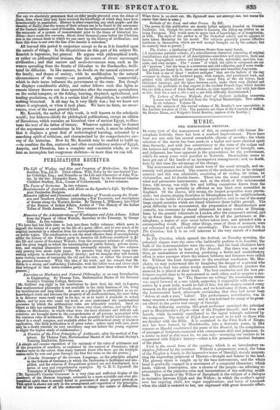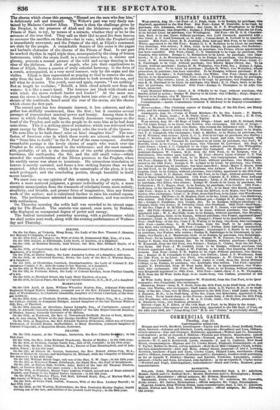MUSIC.
THE BIRMINGHAM FESTIVAL.
Ix every part of the management of this, as compared with former Bir- mingham festivals, there has been a marked improvement. There have been not one only but several remarkable objects of novelty; the whole selection of the music has been made in a higher and more classical spirit than formerly, and with less subserviency to the taste of the vulgar and the laziness and caprice of the performers; and a degree of foresight, care, and judgment, has been apparent in the preparations for the performance, which for many years were peculiar to Norwich. Birmingham seems to have got out of the hands of an incompetent management; and, no doubt, feels by this time the advantage of the change. The instrumental and choral bands were of the usual strength, and ex- tremely well proportioned. The essence of the orchestra lies in its stringed quartet; and this was admirable, consisting of 48 violins, 20 violas, 16 violoncellos, and 10 double-basses. There was the usual complement of wind and percussion instruments; and, as the whole of this instrumental
force, 126 strong, was with few and trifling exceptions drawn from the
Metropolis, it was probably as efficient as any band ever assembled in England. Of the chorus, 272 strong, the largest proportion were provin- cials: but chorus-singing flourishes in Birmingham and its neighbourhood, thanks to tho habits of a manufacturing population, and to one of the many large choral societies which are found wherever those habits prevail. The
great difficulty to be encountered, the preparation of Mendelssohn's new oratorio, was overcome by choral rehearsals for many weeks at Birming- ham, by the general rehearsals in London after the composer's arrival, and
by no fewer than three general rehearsals by all the performers at Bir- mingham; a degree of care never before taken here, and attended with a corresponding result. Many other things, some of them of moment, were not rehearsed at all, and suffered accordingly. This was especially felt in The Creation: but it is an evil inherent in the very nature of a musical festival.
In The Creation, which opened the festival, on Tuesday morning, the principal singers were the same who habitually perform it in London; the bulk of the instrumentalists were the same; and the local choristers have this oratorio as much by heart as The Messiah. But there was, now and then, an unsteadiness or wavering, producing a feeble and unsatisfactory effect in some passages where the utmost boldness and firmness were called for. Without the least derogation to the excellent conductor, Mr. Mos- cheles, we may understand this by imagining the danger of a general who is obliged to lead into action troops mustered from different quarters the moment he is placed at their head. The best conductor and the best per- formers require time to be accustomed to each other, and to acquire a mu- tual understanding. In " The Heavens are telling," the concluding stretto was urged forward at a rate which, supposing it compatible with clear exe- cution by a great body, would be full of fire; but the singers seemed every moment on the point of break-down, and we heard some of them, as well as the instrumental band, afterwards exclaiming, that they had never been "driven at such a pace" before! The performance, nevertheless, was in many respects a magnificent one; and it was indebted for many of its great- est effects to the power and energy of StaudigL On the following morning, this great performer sustained the principal part in Mendelssohn's Elijah—that of the Prophet himself; and won new laurels, while he mainly contributed to the signal triumph achieved by the composer. The story of Elijah does not need to be told to those whO are familiar with the Bible. It is contained in the First Book of Kings; and has been formed, by Mendelssohn, into a dramatic poem, in like manner as Handel constructed the poem of the Messiah, by the compilation of passages of Scripture, executed with consummate skill and judgment. In a notice so brief as this must be, we can only—assuming our readers to be acquainted with Elijah's history—select a few prominent musical features of the piece. First is the novel form of the opening; which is an introductory re. citative, followed by the overture. Without a preparatory sound, the voice of the Prophet is heard, in the impressive tones of Staudigl, sternly announ- cing the impending judgment of Heaven—drought and famine in the land. The gloomy strain is caught up by the bass instruments, and the whole band is gradually engaged in a movement of a congenial character; which leads, without interruption, into a chorus of the people—an affecting re- presentation of the plaintive cries and lamentations of the suffering multi. tude. The episode of the Widow of Zarephath is the subject of a dialogue in recitative between Elijah and the Widow; in which the mother's agony over her expiring child, her eager supplications, and burst of transport when the child is restored to her, are expressed with great dramatic effect. The chorus which closes this passage, "Blessed are the men who fear him," is deliciously soft and tranquil. The Widow's part was very finely sus- tained by Madame Caredori Allan. There is then the challenge given by the Prophet, in the presence of Ahab and the idolatrous people, to the Priests of Baal, to try, by means of a miracle, whether they or he be the servants of the true God. They call on their idol to send fire from heaven to consume the sacrifice on the altar—but in vain; while the Prophet's call is immediately answered; and the Priests of the idol, at Elijah's command, are slain by the people. A remarkable feature of this scene is the pagan and barbaric character of the chorus of the Priests of Baal. In one part its marked rhythm in rapid triple time, accompanied by the clang of brazen instruments, while the strain itself, in a remote minor key, is sinister and gloomy, presents a mental picture of the wild and savage dancing in the rites of the idolaters. A choir of angels, who join their supplications to those of Elijah, forms a quartet of truly celestial harmony, in the form of a corale, accompanied, in a very novel manner, only by the organ and the violins. Elijah is then represented as praying to God to remove the cala- mity from the land. He desires his attendant to look towards the sea, and tell what he descries. The youth, once and again, repeats, " I see nothing." But at length he exclaims, " Behold, a little cloud ariseth now from the waters: it is like a man's hand. The heavens are black with clouds and with wind; the storm rusheth louder and louder!" At the mine mo- ment the storm is heard rising; the people burst into cries of joy; and the shouts of the multitude, heard amid the roar of the storm, are the chorus which closes the first part.
The second part has less dramatic interest, is less coherent, and alto- gether less skilfully constructed, than the first ; but it contains several passages of transcendent musical power and beauty. Among these is the scene in which Jezebel, the Queen, fiercely denounces vengeance on the head of the Prophet, and calls on the people to do unto him as he had done unto them. This is a striking piece of recitative; which was delivered with great energy by Miss Hawes. The people echo the words of the Queen- " Do unto him as he hath done! seize on him! slaughter him!" The con- fusion of ferocious cries in which these words are uttered, reminds us of the " Stone him to death!" in the St. Paul of the same composer. Another remarkable passage is the lovely chorus of angels who watch over the Prophet as he sleeps exhausted in the wilderness: and the most remark- able, probably, of all, is the description of the awful phtenomena—the hurricane, the earthquake, the fire, and the still small voice—which attended the manifestation of the Divine presence to the Prophet, when his earthly career was about to terminate. His miraculous translation to heaven is merely narrated, and forms a less striking feature than we had expected. After this event, which is the catastrophe of the piece, it is too much prolonged; and the concluding portion, though beautiful in itself, moves heavily. We must sum up our opinion of this oratorio in a single sentence. It shows a more matured judgment, a greater individuality of style, a more complete emancipation from the trammels of scholastic forms, more melody, simplicity, and breadth, and greater force of imagination, than any former work of the author; and is Calculated further to raise his exalted reputa- tion. The performance attracted an immense audience, and was received with enthusiasm.
On Thursday morning the noble hall was crowded to its utmost capa- city for The Messiah. The oratorio was opened, once more, by Braham; who displayed an unexpected degree of power and energy.
The festival terminated yesterday morning, with a performance which we shall notice next week, along with the evening performances of Wednes- day and Thursday.



























 Previous page
Previous page